

TheirSpace: Educating Digitally Ethical Teens. Last week I was lucky enough to travel to SxSWedu, a vibrant collective of educators, administrators and edtech entrepreneurs in Austin, TX.
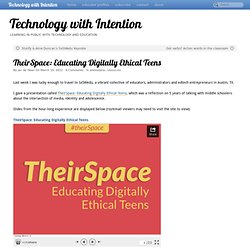
I gave a presentation called TheirSpace: Educating Digitally Ethical Teens, which was a reflection on 5 years of talking with middle schoolers about the intersection of media, identity and adolescence. Teaching and Modeling Good Digital Citizenship. Take Charge of Your Digital Life. Your Reputation Is Your Résumé. Building a career isn’t what it used to be—and we’re not talking about the sputtering economy or the 13.3 percent unemployment rate among 20-to-24-year-olds.
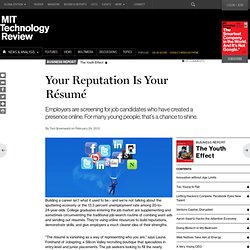
College graduates entering the job market are supplementing and sometimes circumventing the traditional job-search routine of combing want ads and sending out résumés. They’re using online resources to build reputations, demonstrate skills, and give employers a much clearer idea of their strengths. “The résumé is vanishing as a way of representing who you are,” says Launa Forehand of Jobspring, a Silicon Valley recruiting boutique that specializes in entry-level and junior placements. The job seekers looking to fill the nearly 300,000 new jobs in information technology that the U.S.
The new job-search environment affects people of all ages, but younger workers may have an advantage: they’re not shy about putting their lives online. Take David Herrema. FOSI Announces A Platform for Good: Educate About Digital Citizenship and Responsible Technology Use. Privacy in a Networked World. Danah boyd articulates the move from private to public in online spaces about as well as anyone, I think: Social media has prompted a radical shift.
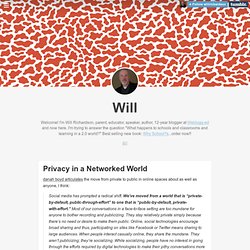
AUSSIE KIDS ‘EARLIEST INTERNET USERS’ Martin Lindstrom: What A Baby's Digital Footprint Does to Families. Last year, the Internet security firm AVG reported that 92% of American children have an online footprint before the ripe old age of 2 years old.
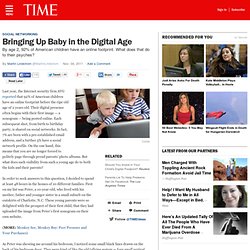
Their digital presence often begins with their first image — a sonogram — being posted online. Each subsequent shot, from birth to birthday party, is shared on social networks. In fact, 7% are born with a pre-established email address, and a further 5% have a social network profile. On the one hand, this means that you are no longer forced to politely page through proud parents’ photo albums. But what does such visibility from such a young age do to both the kids and their parents? In order to seek answers to this question, I decided to spend at least 48 hours in the homes of 10 different families.
(MORE: Monkey See, Monkey Buy: Peer Pressure and Your Purchases) As Peter was showing me around his bedroom, I noticed some small black lines drawn on the back of his bedroom door. eSafety. 6 Most Powerful Search Engines for Social Networks. The Teacher’s Guide To Keeping Students Safe Online. This is the second in a series of online safety discussions. Please be sure to check out Jill Rooney’s recent article for Edudemic ‘ The Student’s Guide To Staying Safe Online ‘ for even more tips and tricks. Most students are familiar with and active users of mobile technology. While it does facilitate sharing and knowledge exchange, it can be a dangerous tool if improperly used. By this I mean students using their smartphones (or dumbphones, for that matter) to share things they would never normally share.
From inappropriate comments to sexting, it’s a dangerous minefield. INFOGRAPHIC: Facebook’s Wall Of Shame? I’ve seen some rather rough criticism of Facebook over the years as they have lurched from one fiasco to another but this infographic, which I found on my cyberspace travels today, kind of sums it all up in a rather dry sarcastic sort of way.
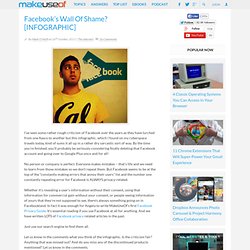
By the time you’re finished, you’ll probably be seriously considering finally deleting that Facebook account and going over to Google Plus once and for all! No person or company is perfect. The (Very) Unofficial Facebook Privacy Guide [DOWNLOAD] Time to lock your Facebook settings and private profile information.
![The (Very) Unofficial Facebook Privacy Guide [DOWNLOAD]](http://cdn.pearltrees.com/s/pic/th/unofficial-facebook-privacy-90301307)
Facebook doesn’t make this easy, however; features are constantly added and the default for each new one seems to favor transparency instead of privacy. This Facebook privacy guide outlines everything you could ever want to know about locking down your privacy on Facebook, and a few things you probably didn’t even know you wanted to know. There are a bunch of important but not so obvious things regarding Facebook privacy. If you use Facebook you should read this guide, if only to understand how public most of your information is.
Tech 5 Digital Footprint Lesson. Teaching Screenagers:Character Education for the Digital Age. Our current technological trajectory promises unfathomable, roller-coaster innovation with no braking system.
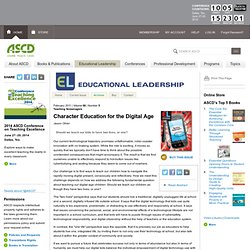
While the ride is exciting, it moves so quickly that we typically don't have time to think about the possible unintended consequences that might accompany it. The power of a positive digital footprint for students — Edjudo. I was reading in the newspaper today about companies charging up to $50,000 offering online reputation management services.

These companies work with small businesses or even individuals and suppress negative comments, bad photos or negative feedback. They do this by flooding search engines with articles, photos, comments and links that paint a more positive image about the business or person. This got me thinking, maybe as teachers we need to show students how to create their own positive digital footprint and encourage them to do so. Until now my digital citizenship and cyber safety talks have focused on the dangers of a negative digital footprint. I have been promoting the “think before you post” message. Creative Commons – a shared culture.
Google teams up with Citizens Advice Bureau.